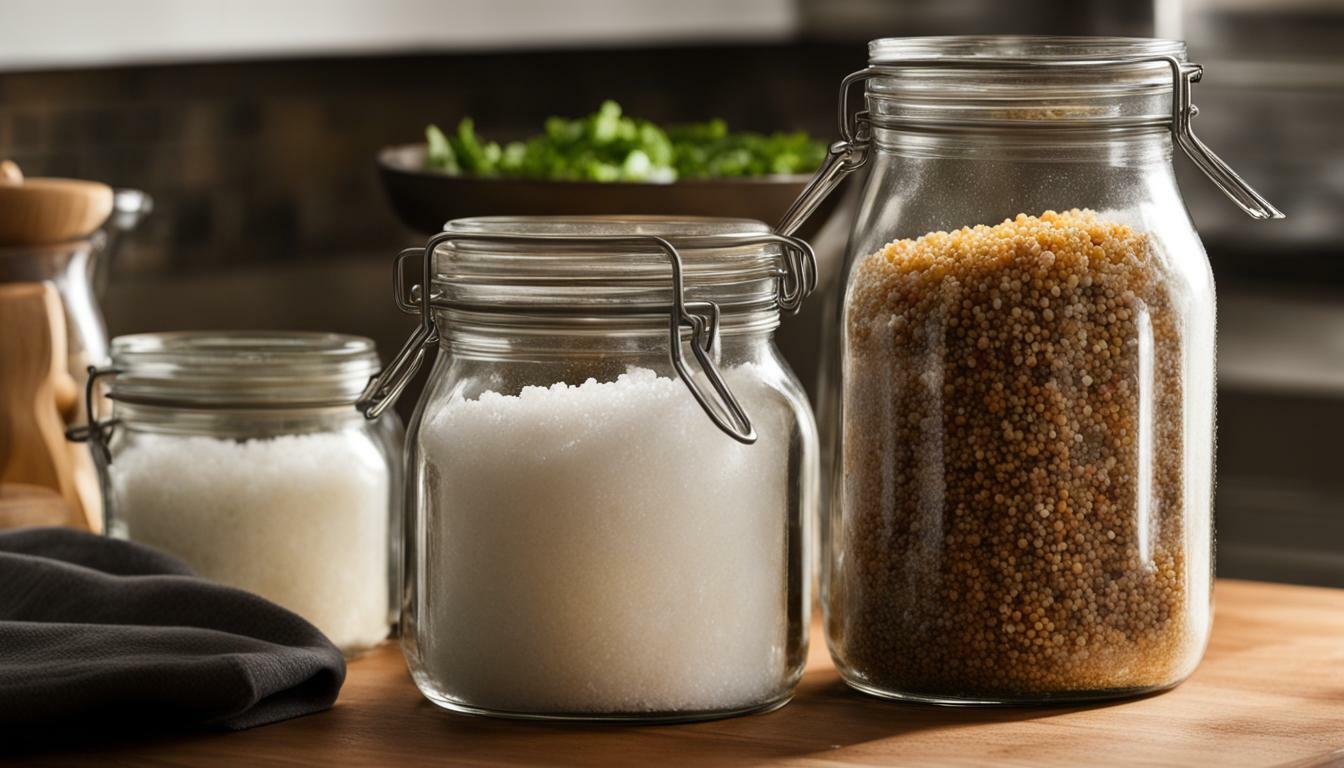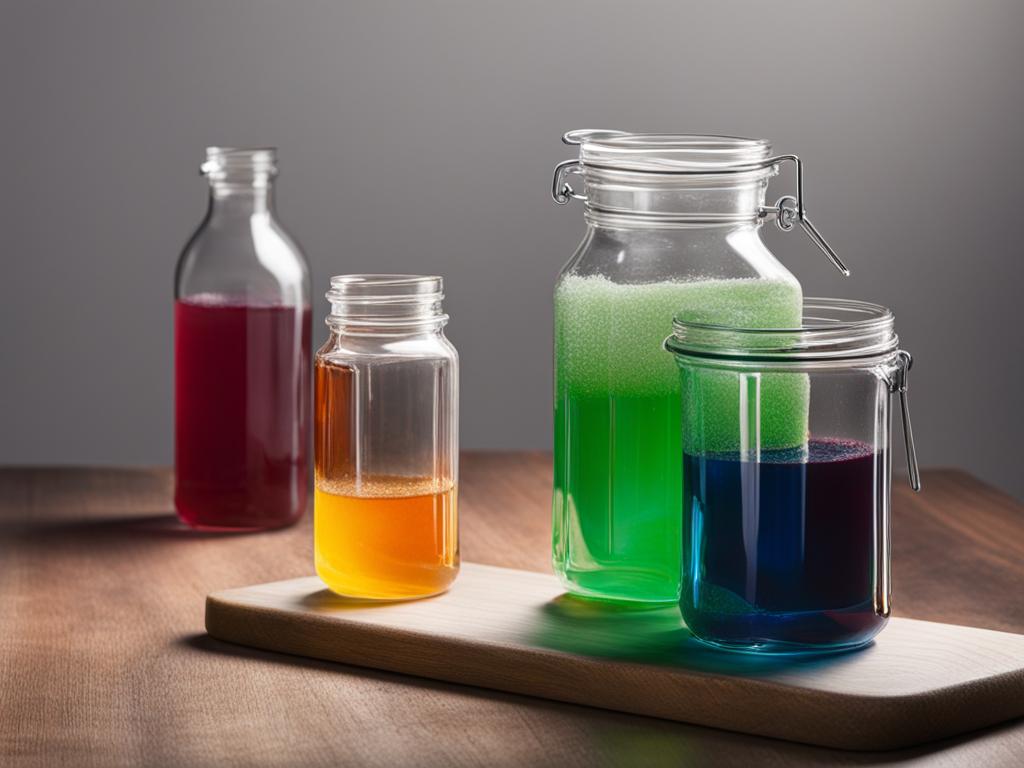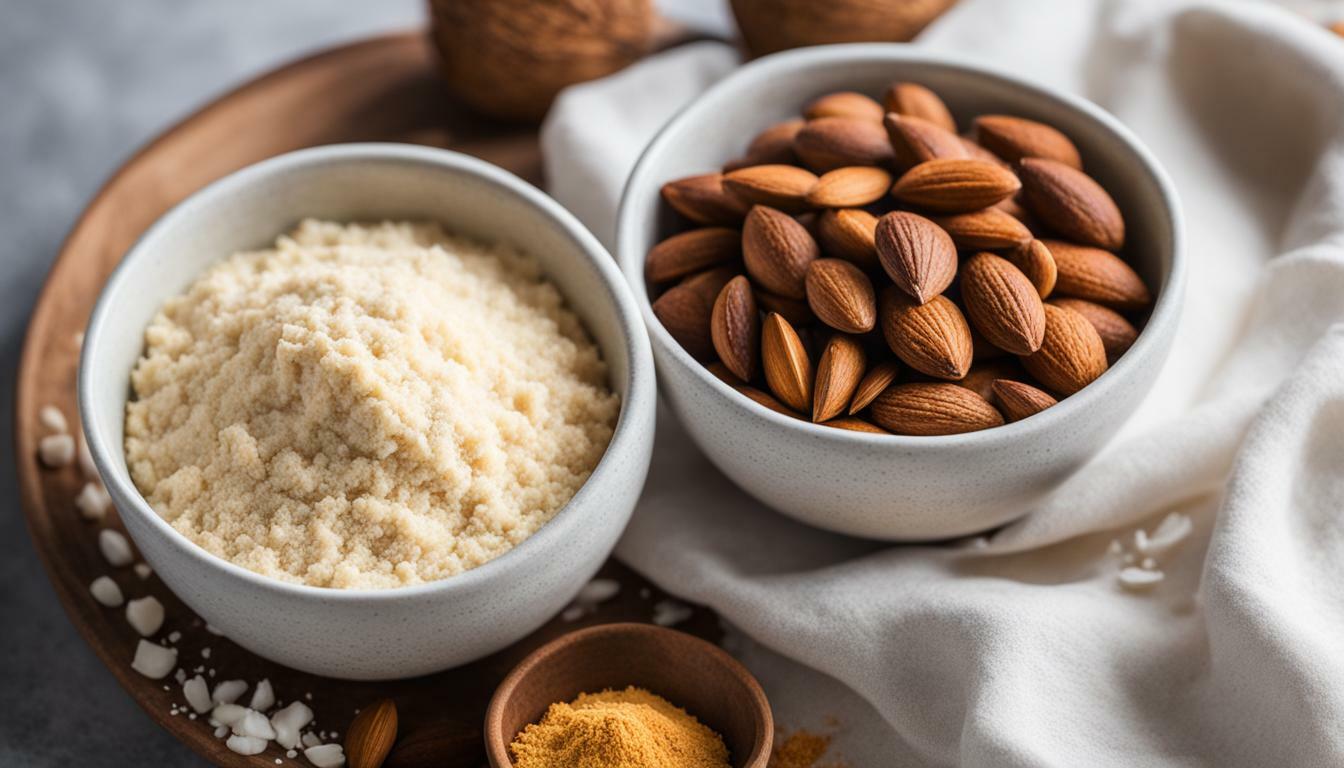When it comes to cooking and seasoning your favorite dishes, you have likely come across two types of salt in your pantry: kosher salt and sea salt. While they may look similar, these two popular salts have distinct differences that can affect the outcome of your dish.
Kosher salt and sea salt differ in their source, texture, and flavor, making them ideal for different culinary applications. In this article, we will explore the key differences between these two salts and their unique properties.
Key Takeaways:
- Kosher salt and sea salt have distinct differences that affect their use in cooking and flavor impact.
- Kosher salt is made by compacting salt crystals, while sea salt is harvested from evaporated seawater.
- Kosher salt has larger, coarser grains than sea salt, which can affect its texture in dishes.
- Sea salt has a more complex flavor profile than kosher salt, with a range of mineral and natural flavor compounds.
What is Kosher Salt?
Kosher salt is a type of salt that is widely used in cooking and is known for its large, coarse crystals and unique texture. It is called “kosher” because of its use in the koshering process of meats, which involves drawing out blood from the meat to make it suitable for consumption according to Jewish dietary laws.
One of the benefits of using kosher salt is its ability to evenly distribute and enhance flavors in dishes. Its large, irregular crystals make it easy to pinch and sprinkle, and it dissolves quickly, making it perfect for seasoning meat and vegetables.
Kosher salt is also used in baking, where its coarse texture and lack of additives can improve the flavor and texture of bread and other baked goods. Additionally, it is sometimes used as a finishing salt, sprinkled on top of dishes before serving to add a final touch of flavor and crunch.
What Makes Kosher Salt Unique?
Compared to table salt, which is heavily processed and contains additives like iodine and anti-caking agents, kosher salt is minimally processed and contains no additives. Its large crystals also make it less dense and less salty than table salt, despite being the same chemical compound, sodium chloride.
Overall, kosher salt is a versatile and flavorful ingredient that is beloved by home cooks and professional chefs alike for its unique properties and versatility in the kitchen.
What is Sea Salt?
Sea salt is a type of salt that is produced through the evaporation of seawater. Unlike table salt, which is heavily processed and often contains additives, sea salt retains its natural minerals and nutrients.
One of the key benefits of sea salt is its high mineral content, which can include magnesium, potassium, and calcium, among others. These minerals can provide health benefits, such as improving bone density, reducing inflammation, and regulating blood pressure.
Sea salt is also popular among chefs and home cooks for its distinct flavor and texture. Its coarse texture and large crystal size make it ideal for use as a finishing salt, sprinkled on top of dishes just before serving. Additionally, sea salt can enhance and bring out the natural flavors of food without overwhelming them.
Some common uses for sea salt include seasoning meats and seafood, adding flavor to soups and stews, or even as a garnish for cocktails. However, it’s worth noting that sea salt can vary in flavor and mineral content depending on its source and production method.
Sea Salt Benefits
In addition to its potential health benefits, sea salt can also improve the taste and texture of dishes. Its unique mineral composition and large crystal size can add depth and complexity to flavors, and its coarse texture can provide a satisfying crunch.
Additionally, some people believe that sea salt can provide skin and hair benefits when used in beauty treatments. The minerals found in sea salt can help to exfoliate and moisturize the skin, as well as improve hair strength and texture.
Sea Salt Uses
Sea salt has a wide range of uses in cooking, from seasoning meats and vegetables to adding flavor to baked goods. Its large crystal size and coarse texture make it ideal for use as a finishing salt, added to dishes just before serving to provide a satisfying crunch and burst of flavor.
Some specific uses for sea salt include:
- Seasoning grilled or roasted meats and seafood
- Adding flavor to soups, stews, and sauces
- Sprinkling on vegetables and salads for added crunch and flavor
- Using in baked goods like breads and cookies for a unique flavor and texture
- As a rim garnish for cocktails like margaritas and Bloody Marys
Differences in Production
Kosher salt and sea salt are both produced in very different ways. Kosher salt is made by compacting salt crystals together to form irregularly shaped flakes. It gets its name from its use in the koshering process of meat, which involves drawing blood out of the meat with salt. Kosher salt is also free of additives such as iodine, making it a popular choice among chefs for its pure taste.
Sea salt, on the other hand, is made by evaporating sea water, leaving behind salt crystals that are then harvested. It can be processed in a variety of ways, including both traditional and modern methods. Sea salt often contains trace minerals such as magnesium, calcium, and potassium, which can impact its flavor and color.
When comparing kosher salt vs table salt, table salt is heavily processed and often contains additives such as iodine and anti-caking agents. It is also highly refined, resulting in a small, uniform crystal size. In contrast, kosher salt has larger, irregularly shaped crystals, which can impact its use in cooking and the amount needed for seasoning.
Flavor and Texture Differences
One of the key differences between kosher salt and sea salt is their flavor and texture.
Kosher salt has a larger grain size and a slightly flaky texture, making it ideal for seasoning meat before cooking. Its coarse structure dissolves slowly, allowing for a more even distribution of salt on the surface of the meat.
On the other hand, sea salt comes in a variety of shapes and sizes. It has a more delicate texture and a briny flavor, thanks to its mineral content and the natural saltwater evaporation process. Chefs often use sea salt as a finishing salt, sprinkling it over finished dishes to add a pop of flavor and texture.
When comparing kosher salt vs sea salt, it’s important to consider the dish you’re preparing and the impact you want the salt to have. While kosher salt is perfect for seasoning meat and adding a mild saltiness to soups and stews, sea salt is best used as a finishing touch to add a burst of flavor to salads, seafood, and other dishes.
Health Considerations
When it comes to health considerations, there are a few key differences between kosher salt and sea salt. While both types of salt are high in sodium, sea salt is often touted as the healthier option due to its mineral content. Sea salt typically contains small amounts of minerals like magnesium, potassium, and calcium, which can have a positive impact on overall health.
Kosher salt, on the other hand, is free of any additional minerals and is simply made up of sodium chloride. This means that while it doesn’t offer any additional health benefits, it can be a good option for those on a low-sodium diet or looking to control their salt intake.
It’s worth noting that while both types of salt are seen as “natural” options, sea salt can sometimes contain trace amounts of microplastics or pollutants depending on its source. However, this is usually not a significant concern in small amounts.
Ultimately, the choice between kosher salt and sea salt for health reasons may come down to personal preference and individual dietary needs. Consulting a healthcare professional or registered dietitian can be a helpful resource when making these decisions.
Conclusion
In conclusion, understanding the difference between kosher salt and sea salt is essential for any chef or home cook. While both types of salt are used to enhance flavor, there are significant differences in their properties, production methods, and impact on health.
Kosher salt is a coarse-grained salt that is made by compacting salt crystals together. Its unique structure makes it ideal for seasoning meats and vegetables, as it adheres well to their surfaces. It also dissolves quickly, making it easier to use in cooking.
On the other hand, sea salt is harvested from the ocean and undergoes minimal processing, meaning it retains more minerals than other types of salt. Its unique flavor profile makes it a popular choice for finishing dishes and adding an extra layer of complexity to flavors.
When it comes to health considerations, both kosher salt and sea salt contain sodium, but sea salt has a slightly higher mineral content. However, using any type of salt in excess can have negative health effects, so moderation is key.
In summary, the choice between kosher salt and sea salt ultimately comes down to personal preference and the specific dish being prepared. Understanding the differences between the two can help you elevate your cooking and create more nuanced flavors.
FAQ
Q: What is the difference between kosher salt and sea salt?
A: Kosher salt and sea salt are both types of salt, but they differ in their sources, production methods, and taste. Kosher salt is made by compacting large, coarse salt crystals, while sea salt is harvested from evaporated seawater.
Q: What is kosher salt used for?
A: Kosher salt is commonly used in cooking and is known for its ability to enhance flavors. Its coarse texture makes it ideal for seasoning meat, brining, and drawing out moisture from vegetables.
Q: What are the benefits of sea salt?
A: Sea salt contains trace minerals that can add depth of flavor to dishes. It is also believed to have a more natural and less processed taste compared to table salt.
Q: How is kosher salt different from table salt?
A: Kosher salt is less processed and does not contain additives like anti-caking agents, which are often found in table salt. Kosher salt also has larger grains, which can give dishes a more pronounced flavor.
Q: How do the flavors and textures of kosher salt and sea salt differ?
A: Kosher salt has a light, clean taste and a coarse texture, while sea salt can have subtle variations in taste depending on its source. Sea salt also tends to have a crunchier texture due to its larger, irregularly shaped crystals.
Q: Are there any health considerations when using kosher salt and sea salt?
A: Both kosher salt and sea salt contain sodium, so moderation is important. However, sea salt may contain trace minerals that can provide some health benefits, while kosher salt does not have these additional minerals.
 Skip to main content
Skip to main content


